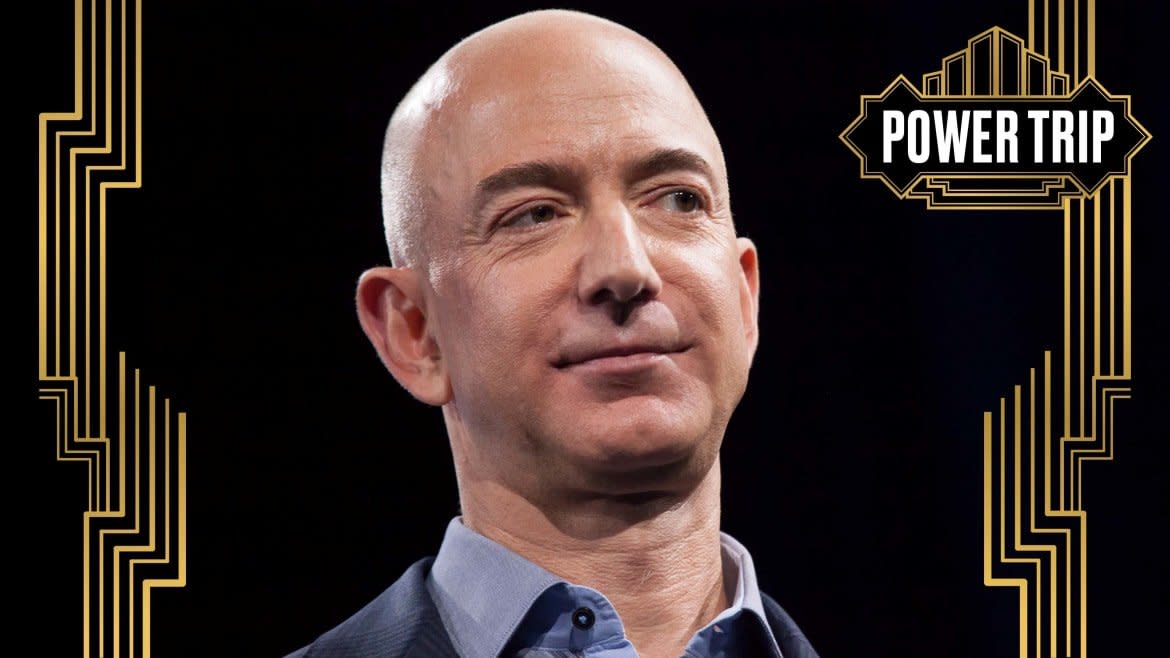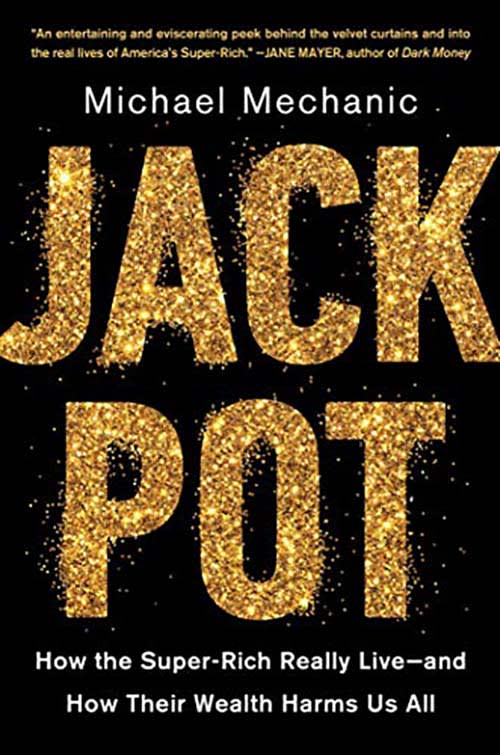How the Rich Mask Their Greed With Ostentatious Philanthropy

- Oops!Something went wrong.Please try again later.
Wondering how to accessorize that $450,000 Rolls-Royce Phantom you just bought? How about shelling out a few more bucks for the Starlight Headliner, which embeds thousands of LED lights in the car’s leather ceiling. and can be configured to look like the stars as they appeared on the day you were born? Just the thing for that rich person into excess, with no sense of good taste.
And yours for only $12,000.
“Money doesn’t change your ability to be tasteful,” says Michael Mechanic, author of the new book Jackpot: How the Super-Rich Really Live—and How Their Wealth Harms Us All. Great wealth, he adds, means “you can do everything on a large scale, so it becomes obvious. ‘Look what I’ve got.’ It’s like showmanship.”
Mechanic’s meticulously researched book is about way more than the rich and their obscene acquisitiveness. It’s an often frightening primer on how the Trumps, Kardashians, Bezos, and Sacklers of the world have their way in just about everything, whether it’s getting into the best colleges, obtaining the best health care or influencing legislation that can benefit them financially.
The attitude seems to be, says Mechanic, especially when it comes to political clout, “this is my money, and I want to keep as much of it as possible. They have political clout, and they use that clout, and they pay less taxes than the people at the bottom. It’s legal, but not really ethical, because you’re perpetuating an unfair system.”
Billionaire Couple Pledges to Give Away 5% a Year—and Gets Dunked On
And yet, Mechanic makes the point that greed and the attendant legend of upward mobility are not exclusive to the wealthy, and in fact have always been a part of the American ethos. “The first white settlers came here to make money,” he says. “They were from the Virginia Company, and they were looking for precious metals. A lot of development has been the result of land rushes, and the gold rush. It’s capitalism without rules; if you’re allowed to do whatever to maximize your wealth, that’s what people tend to do.”
So, the top 0.01 percent (those with at least $157 million) and 0.001 percent (1,840 families with at least $805 million) get to do pretty much whatever they want. They have access to prominent people from all walks of life, buy houses in spectacular settings, can afford membership-based concierge health practices, build luxury safe rooms in their mansions (with home theaters and bomb-resistant doors), and set up so-called “family offices,” which are limited liability companies composed of real estate experts, lawyers, accountants, financiers, aircraft managers, and security personnel to run their affairs—at the cost of as much as $10 million.
“We are increasingly segregated by wealth,” says Mechanic in the book. He notes that when he reached out to the very wealthy to interview them, even if he had a solid introduction, their entourages intervened with pre-interviews or outright rejections.
You can thank Ronald Reagan and his tax cuts for the wealthy for the current economic disparity, which former Wisconsin Senator Russ Feingold says has created “a robber baron era on steroids.” Tax policy is where the ultrawealthy really kick butt, says Mechanic, noting that Americans in the lowest income category pay 10 cents in sales tax on every dollar they earn, while the richest pay a penny or two. And the rich want more, even more—over the past decade the GOP, influenced by the financial contributions of the wealthy, have introduced no fewer than 44 bills to repeal the estate tax. Luckily, they haven’t succeeded—yet.
Gucci Clan Thinks Hollywood Stars Not Fit to Play Them
“You’ve seen the high tax rates go away with Reagan,” says Mechanic, “and now you see such an explosion of wealth since the mid ’80s. In a political system with few rules, money has vast power.”
This money juggernaut also reaches into the philanthropic field. In possibly the most eye-opening chapter in Jackpot, Mechanic shows how the millionaires and billionaires who give the most to charity can also be the same people who helped create the conditions that need to be alleviated. In other words, they avoid paying taxes, underpay their workers, then try to make up for it, or distract the rest of us, with grand philanthropic gestures. Mechanic says some of these folks have “weaponized” philanthropy to serve their own philosophical and business interests. He singles out the notorious Sackler family of Oxycontin notoriety, who are big on giving money to cultural institutions. In fact, most of the big, highly publicized giving goes to cultural institutions, hospitals, and universities that are already well funded, and does not go for social change.
“I think a lot of them engage in reputation laundering” with their philanthropy, says Mechanic. “If you are fighting to pay your workers as little as possible, how could you not know what you’re doing?”
Sure, there’s the highly publicized Giving Pledge, in which the very wealthy promise to donate most of their money to philanthropic causes, but it’s totally voluntary, and according to Mechanic, only about 1 in 13 of the world’s billionaires are participating. Which means it’s impossible to predict whether this will make any difference at all to the poorest in our society.
So what, as Mechanic puts it, keeps us from a 21st century version of the French Revolution? What with the pandemic, BLM, and a liberal government in power, the times seem right for significant cultural change. But, says Mechanic in the book, “our situation depends on a broader cultural ethos that conflates marketplace success with self-worth, and insists that whatever our circumstances, anyone with smarts and moxie can one day drive that Bentley, fly in that Gulfstream, and live in that mansion. This is the myth that keeps the pitchforks at bay.”

Perhaps surprisingly, Mechanic is optimistic that things can change, and says instead of a blood-soaked revolution, “it has to be a revolution of thought. People with money have always held power in this country, and to change things, you have to change their thinking. I think a lot of wealthy people are disgusted with this political upheaval they’ve seen, and maybe they think things aren’t fair. Some rich people are really worried about retribution, and who wants to live in fear? I think more are saying the way we are living is not right, and we should support some change.”
Get our top stories in your inbox every day. Sign up now!
Daily Beast Membership: Beast Inside goes deeper on the stories that matter to you. Learn more.

